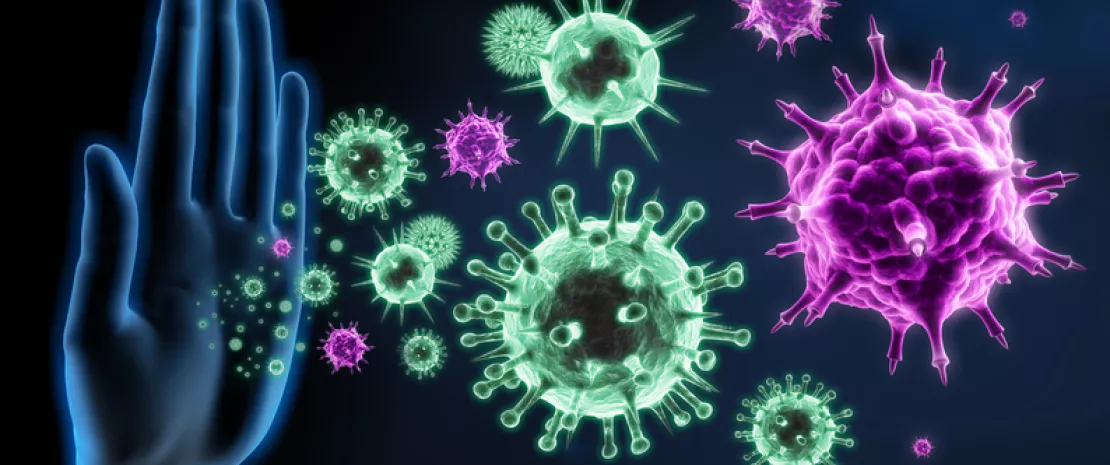Microbiota and immune cells as intestinal sentinels
With COVID-19 continuing to spread, we all hope to have the necessary equipment to fight it. From birth onwards, the immune system accomplishes its defense mission in close cooperation with the gut microbiota.
- Learn all about microbiota
- Microbiota and related conditions
- Act on your microbiota
- Publications
- About the Institute
Healthcare professionals section
Find here your dedicated section
Sources
This article is based on scientific information

About this article
Whether it is the coronavirus or not, any microbe (bacterium, virus or fungus) that enters our body is potentially dangerous. When this occurs, defense mechanisms carefully orchestrated by immune cells and the intestinal flora are put into action to eliminate it. This protective barrier, erected by the intestine, prevents foreign bodies from entering the bloodstream.
Intestinal barrier
The purpose of this immune system-gut alliance is to promote and maintain intestinal balance throughout our lifetime. The gut microbiota forms a microbial lining which prevents bad bacteria from colonizing the gut and multiplying. A balance between intestinal cells and flora creates an environment conducive to the development of good bacteria. On the contrary, any change in this ecosystem alters the interactions involved: a vicious circle sets in whereby inflammation promotes colonization by harmful microorganisms, which in turn exacerbate inflammation. Intestinal cells, for their part, form a natural physical barrier lined with thick mucus which ensures that bacteria, viruses and fungi are confined to the center of the gastrointestinal tract.
Intestinal defense cells
Some immune cells, such as (sidenote: Macrophages and lymphocytes Macrophages and lymphocytes are white blood cells that act as immune cells. They defend the body by eliminating intruders ) , promote innate immunity, which is quick-acting but (sidenote: Non-specific action is general and not targeted against a particular molecule or microbe. ) : “I see you, I catch you, I kill you”. The rest, including (sidenote: Macrophages and lymphocytes Macrophages and lymphocytes are white blood cells that act as immune cells. They defend the body by eliminating intruders ) , are part of the adaptive immune system, which mobilizes more slowly, is (sidenote: Specific action is targeted against a particular molecule or microbe. ) and remembers previous infections: “I recognize you, I catch you, I kill you”. Among other functions, cells of the adaptive immune system produce antibodies. Precise control of the immune system prevents excessive inflammation in response to good bacteria and avoids food allergies by allowing tolerance of (sidenote: Nutrients Nutrients are small molecules released during the digestion of food. )
Highly synchronized cooperation
Bacteria are in constant dialogue with the intestine, either directly or through the transmission of signals. The messages received enable the immune cells to be on constant alert and to strengthen the intestinal barrier where necessary. They also facilitate activation of the innate and adaptive immune responses. According to studies carried out on animals, these exchanges have an impact on other organs too: a diet rich in fiber enables the microbiota to produce small molecules that have a beneficial effect on pulmonary allergic responses. Indeed, the microbiota can slow excessive inflammation even at a distance from the intestine (infection, stress, seasonal allergy or (sidenote: Food intolerance occurs when the immune system incorrectly identifies food molecules as harmful substances. ) ).
Boosting our microbiome
Even if these mechanisms are still to be confirmed in humans, and although studies on a possible link between COVID-19, microbiota and the immune system are incomplete, a healthy lifestyle which takes care of the microbiota (with a balanced diet for example) seems to be the best way of maintaining our intestinal barrier.
Gaboriau-Routhiau, Cerf-Bensussan. Microbiote intestinal et développement du système immunitaire 2016. Med Sci (Paris). 32(11): 961–967.
Caminero A, Meisel M, Jabri B, et al. Mechanisms by which gut microorganisms influence food sensitivities. Nat Rev Gastroenterol Hepatol. 2019;16(1):7‐18.
https://www.futura-sciences.com/sante/questions-reponses/medecine-intestin-role-joue-t-il-immunite-11392/
https://www.futura-sciences.com/sante/actualites/nutrition-diversite-microbiote-favorise-renforcement-systeme-immunitaire-80225/











